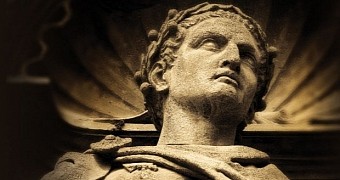In a recent paper in the journal Neurological Sciences, researchers with the Imperial College London in the UK argue that Julius Caesar's declining mental and physical health in his later years was likely due to a series of strokes.
The scientists say that, although not serious enough to cripple the Roman ruler, these episodes altered his brain just enough to trigger personality changes and even depression.
Besides, the Imperial College London researchers believe that other symptoms displayed by Julius Caesar in the years leading up to his death, i.e. dizziness, weakness and vertigo, can too be attributed to a series of mini-strokes.
Other diagnoses simply don't hold, the scientists say
Historical records, the Greek historian Plutarch's biography of Julius Caesar included, describe the Roman ruler collapsing on several occasions and behaving erratically in his later years.
The Greek historian points the finger at epilepsy as an explanation for this cohort of symptoms. Although other diagnoses such as parasitic infections were proposed over the years, it was Plutarch's opinion on what was making Julius Caesar sick that prevailed.
The thing is that, according to specialists at the Imperial College London, the Greek historian failed to accurately diagnose the Roman leader. Thus, they argue that strokes best explain his symptoms.
“All of the symptoms reported in Caesar’s life are compatible with him having multiple mini-strokes. The idea that he was epileptic is unfounded. Our theory is simpler and more logical,” said researcher Francesco Galassi in an interview, as cited by The Guardian.
As mentioned, Francesco Galassi and colleagues suspect that, apart from causing him to experience dizziness, weakness and vertigo, the strokes triggered Julius Caesar's depression and mood swings.
Epilepsy was a fancy diagnosis in Julius Caesar's time
Interestingly, it looks like Plutarch didn't diagnose the Roman leader with epilepsy simply because this medical condition was the best explanation that he could come up with to account for all of his symptoms.
Writing in the journal Neurological Sciences, the Imperial College London researchers explain that, in those days, many believed epilepsy to be the result of being possessed by a deity of sorts.
Because of this, people who displayed symptoms associated with this medical condition were believed to be favored by the gods and consequently have incredible power. Otherwise put, odds are Julius Caesar didn't exactly mind having people go around saying that he had epilepsy.

 14 DAY TRIAL //
14 DAY TRIAL //